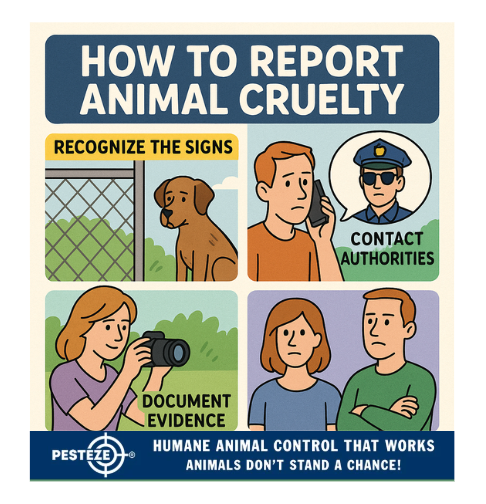HOW TO REPORT ANIMAL CRUELTY IN YOUR AREA

HOW TO REPORT ANIMAL CRUELTY IN YOUR AREA
SUMMARY
Animal cruelty is a serious issue that harms both pets and wildlife. This guide explains how to recognize abuse, the proper channels for reporting, and why community involvement is essential to protecting animals.
FEATURES
-
Recognize the signs: Know the indicators of neglect or abuse.
-
Document evidence: Photos, videos, and notes strengthen your report.
-
Contact local authorities: Call animal control or law enforcement.
-
Use hotlines and agencies: National cruelty hotlines may assist.
-
Stay anonymous if needed: Protect your identity while reporting.
-
Follow up: Ensure the report is being addressed.
GUIDE DESCRIPTION
Animal cruelty takes many forms, from neglect and abandonment to physical abuse and hoarding. Recognizing and reporting cruelty is one of the most effective ways communities can protect vulnerable animals. Understanding how to report animal cruelty in your area ensures that action is taken swiftly and legally.
The first step is to recognize the signs. Common indicators of abuse include visible injuries, extremely thin animals, untreated medical issues, lack of food or clean water, poor living conditions, or animals left outside in extreme weather without shelter. Wildlife cruelty may include illegal trapping, poisoning, or harm to protected species.
Once abuse is suspected, document evidence if it is safe to do so. Photographs, short videos, and written notes about the date, time, and location can help authorities build a strong case. Never trespass or put yourself at risk to gather evidence—your safety is also important.
The next step is to contact local authorities. In most communities, this means calling animal control, humane societies, or law enforcement. Provide them with as many details as possible, including descriptions of the animals, conditions, and location.
There are also hotlines and agencies that may help. In the United States, the ASPCA and Humane Society offer resources and contact points for reporting cruelty. Other countries have similar national or regional organizations dedicated to animal welfare.
If you are concerned about retaliation, most agencies allow you to report anonymously. You do not need to reveal your identity to help an animal in need, though providing contact information may help investigators follow up for more details.
Finally, always follow up on your report. Contact the agency again after a reasonable time to ensure action has been taken. While privacy laws may limit the information they can share, you can still confirm whether your report was investigated.
By recognizing cruelty, documenting it, and contacting the right organizations, you play a crucial role in protecting animals. Community awareness and reporting not only save lives but also help enforce laws and hold abusers accountable.
- Saneeth Thota


Comments 0